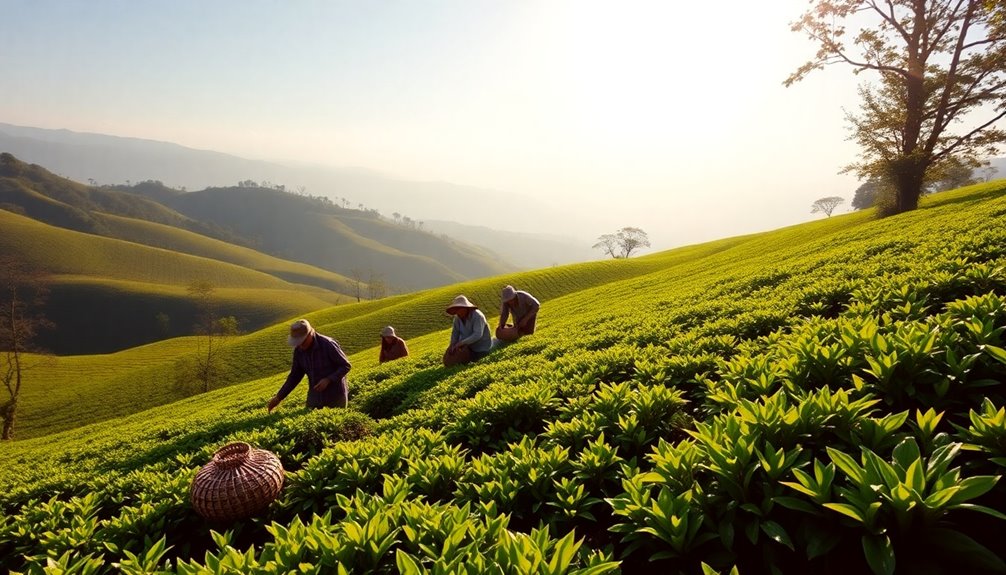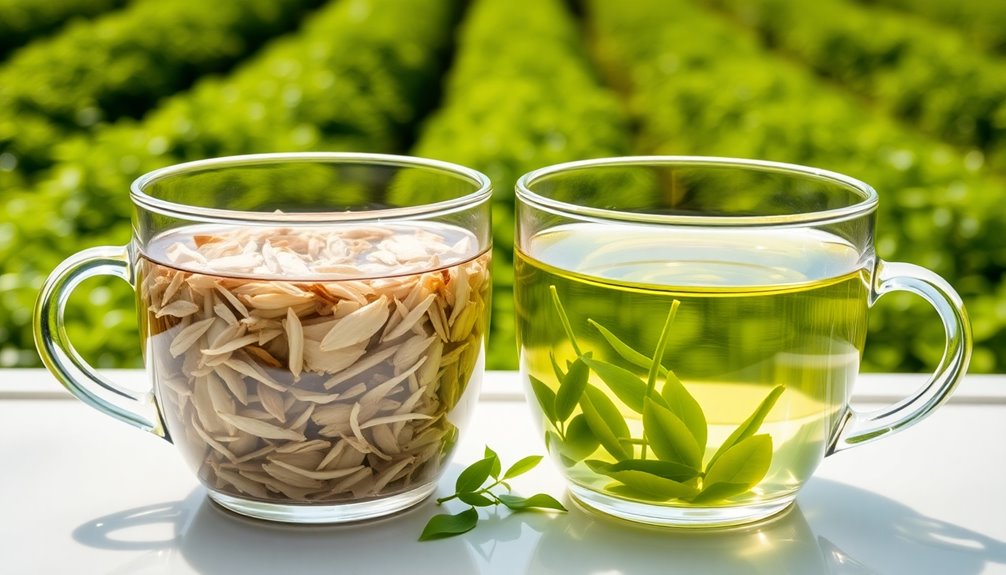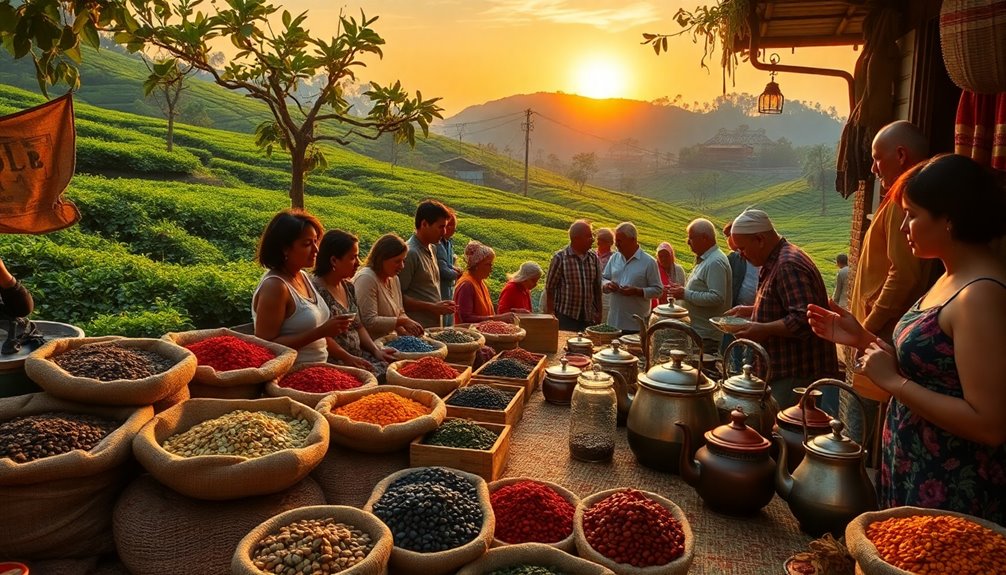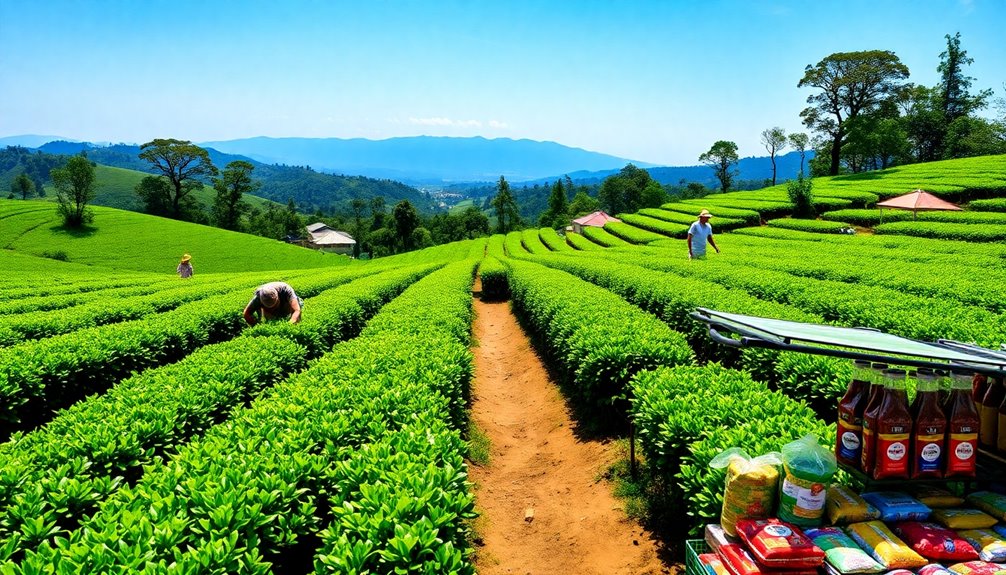Small farmers are super important in the global tea market! They grow more than half of the world's tea and manage about 70% of the land where tea is grown. These dedicated farmers help their local economies thrive, especially in places like China, Vietnam, Kenya, and Sri Lanka. While they face challenges, like low prices and limited market access, many are using eco-friendly farming methods to improve their tea's quality. By joining cooperatives and sharing resources, they can boost their profits and reach more customers. Keep exploring to discover how these farmers are changing the tea industry!
Key Takeaways
- Smallholder farmers produce over 50% of the world's tea, managing around 70% of global tea acreage.
- They contribute significantly to local economies, especially in countries like China, Kenya, and Sri Lanka.
- Smallholders face challenges such as low prices and limited market access, receiving only 1-2% of the retail price.
- Adoption of sustainable practices and cooperative structures can improve their income and market opportunities.
- Growing demand for organic tea and digital initiatives can empower small farmers and enhance their livelihoods.
Introduction
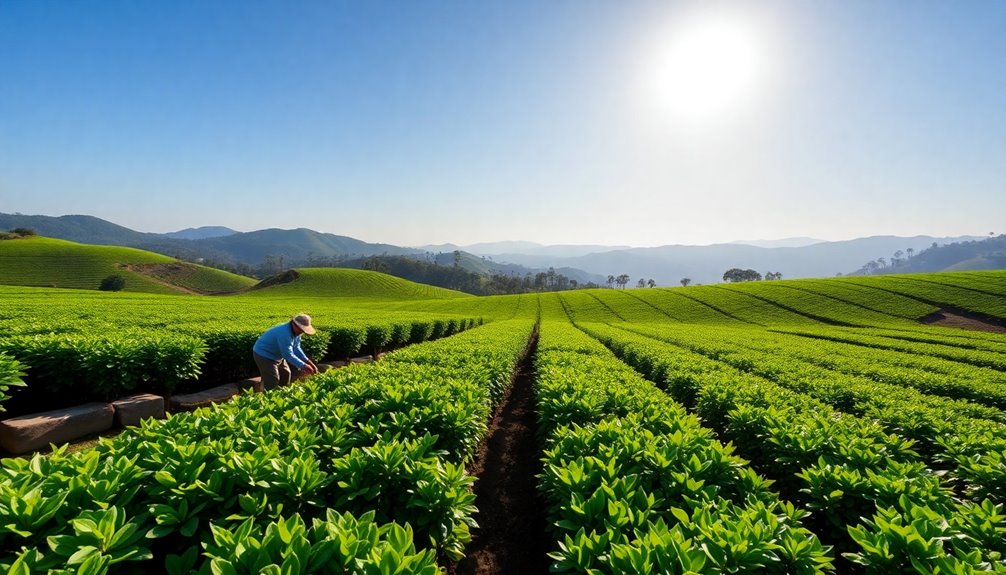
In the heart of the global tea market, small farmers play a vital role, producing over half of the world's tea and managing a staggering 70% of tea acreage.
These small tea growers, often called smallholder tea farmers, are essential to local economies, providing jobs and income for millions. In countries like China, Vietnam, Kenya, and Sri Lanka, smallholders make up a huge part of tea production. They face challenges, though. Many have limited access to markets, making it tough to sell their tea at better prices.
Despite these hurdles, small tea farmers contribute greatly to their communities. The income from tea helps families pay for education and healthcare, creating a brighter future.
Empowerment initiatives, like cooperatives, are crucial. By joining forces, these farmers can strengthen their bargaining power, making it easier to trade and earn fair prices.
When you support smallholder tea, you're not just enjoying a cup of tea; you're helping to uplift communities.
It's exciting to think about the difference you can make just by choosing tea from these hardworking farmers. Together, we can celebrate the rich flavors and stories behind every sip!
Smallholders Produce 70% Tea
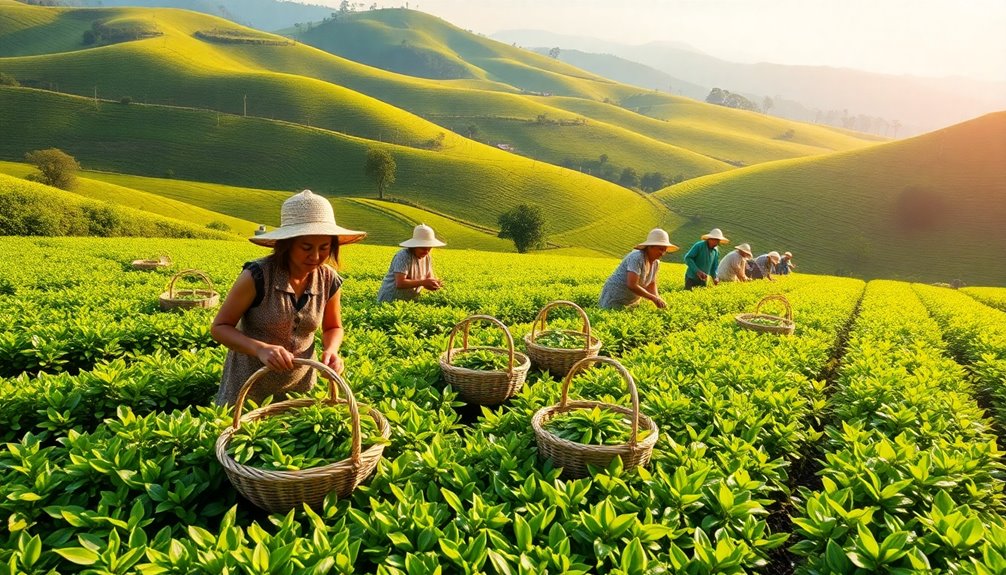
Smallholder tea farmers make up a powerhouse in the global tea market, producing over half of the world's tea while managing about 70% of the tea acreage. These small tea growers, around 15 million strong, work hard in rural areas across countries like China, Vietnam, Kenya, and Sri Lanka.
In fact, in China and Vietnam, smallholders produce about 80% of the tea volume! That's a huge number!
These farmers often have small gardens, usually just 0.5 to 0.75 hectares, where they grow tea alongside other crops. This diversity helps them create quality and unique products, like specialty teas that many people love.
However, despite their amazing contributions, smallholders face challenges. They often struggle with limited access to credit and find it hard to get good prices for their tea. This situation makes it tough for them to thrive in the tea supply chain.
Still, smallholders are a major source of employment in their communities. Their hard work and dedication keep the tea flowing and bring joy to tea drinkers everywhere! It's clear that smallholders are essential to the tea industry.
Sustainable Practices Enhance Yields
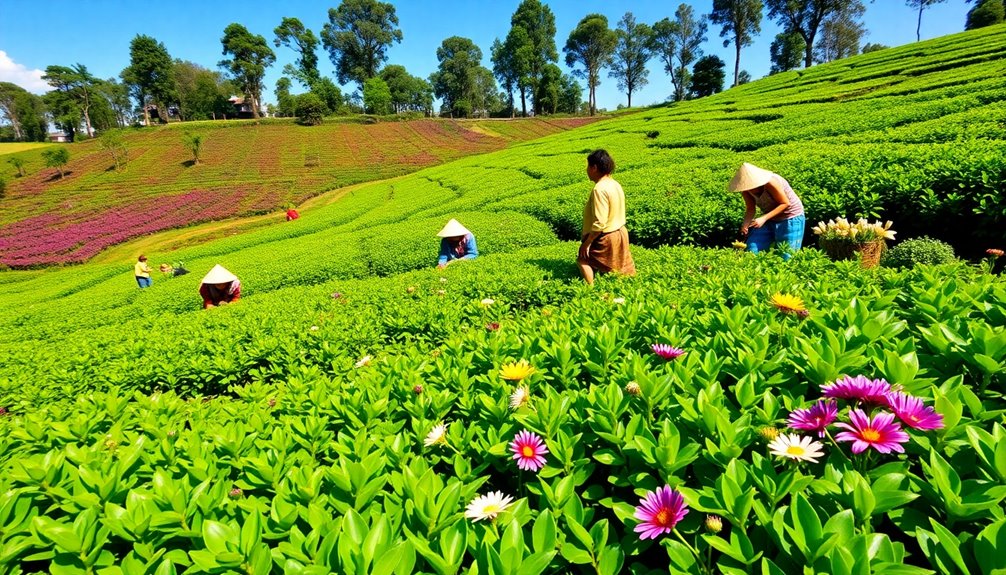
Sustainable farming practices among smallholder tea farmers are transforming the tea industry. By using organic farming methods, small tea growers aren't only caring for the environment but also enhancing their yields. This means better tea and healthier plants! These sustainable practices help preserve biodiversity too.
With mixed cropping systems, farmers keep local ecosystems thriving while boosting their productivity. Transitioning to organic certification can take time, but it's worth it. Once smallholder tea farmers achieve this, they often get higher prices for their crops. This encourages them to continue improving their sustainable practices.
Cooperative structures play a big role, too. When farmers work together, they can share resources and knowledge, making it easier to adopt these eco-friendly methods. This teamwork enhances their market access, letting them reach more customers.
Training programs, like those from the Kenya Tea Development Agency, equip smallholders with important skills in sustainable crop management. This leads to even more significant increases in tea yields and strengthens their economic resilience.
It's exciting to see how smallholder tea farmers are leading the way in sustainable practices, creating a brighter future for everyone involved in the tea market!
Innovative Pest Management Techniques
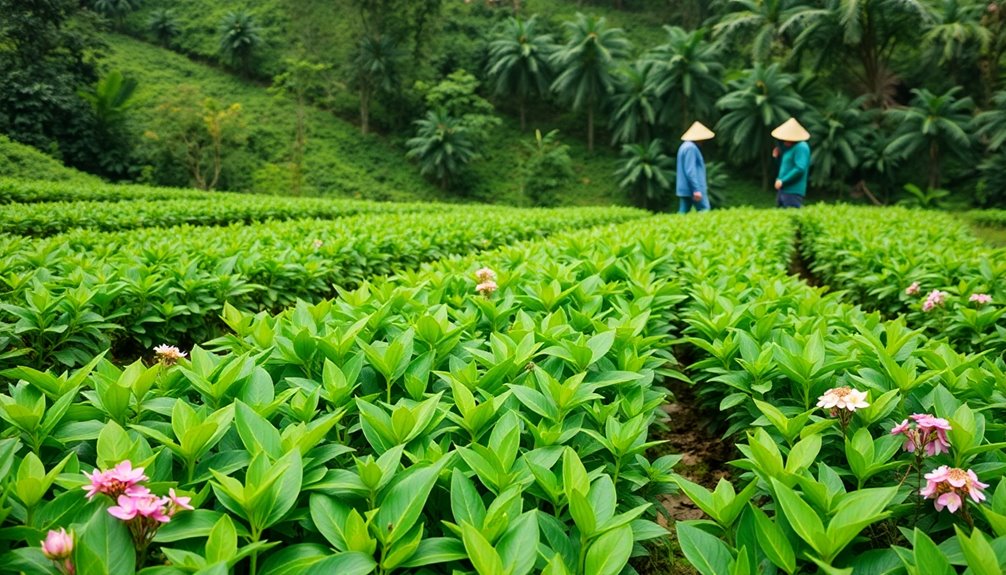
Facing challenges with pest management, many tea farmers are turning to innovative techniques to enhance their crop resilience and productivity. Small tea growers are discovering that Integrated Pest Management (IPM) can be a game changer. This method combines natural predators and organic pesticides, which helps reduce the use of harmful chemicals.
By adopting these innovative pest management strategies, farmers not only protect their crops but also improve tea quality.
Training programs, like those from the Kenya Tea Development Agency (KTDA), play a vital role in helping you learn effective pest control methods. These programs guide you through the transition to organic farming methods, making it easier to adapt your practices.
Plus, sustainable farming can lead to better market prices for your tea, as more consumers want products that are friendly to the planet.
With climate change affecting farming, these techniques become even more important. You'll find that as you embrace these practices, your crops become stronger, and you contribute to the environment's health.
It's exciting to see how small farmers can thrive by using innovative approaches to pest management, ensuring a bright future in the global tea market.
Market Access Inequities
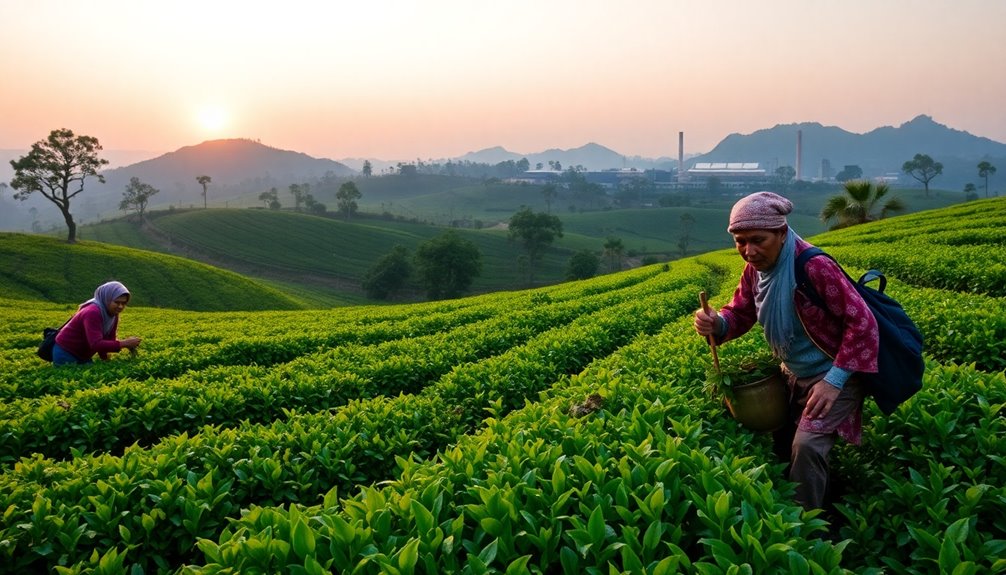
Navigating market access inequities poses a significant challenge for many tea farmers. Small tea growers, who make up about 70% of the tea acreage worldwide, often find it hard to connect with larger markets. Unfortunately, they only receive 1-2% of the retail price of tea, while traders and retailers keep most of the profit. This means smallholder farmers struggle to earn a decent income.
In places like Sri Lanka and Uganda, things get even tougher. Negative views about the tea market and low prices make it hard for these farmers to get fair compensation for their hard work. High certification costs for fair trade and organic labels can also stop them from reaching premium markets. If they can't afford these certifications, their chances of selling to better markets shrink.
Limited access to credit and advanced farming techniques makes it even harder for smallholders to invest in their production. Without these resources, they can't improve their farms or compete effectively.
All these barriers create a cycle of limited access, which keeps smallholder farmers from thriving in the tea sector. It's a tough road, but awareness can help spark change for these dedicated farmers!
Practical Applications
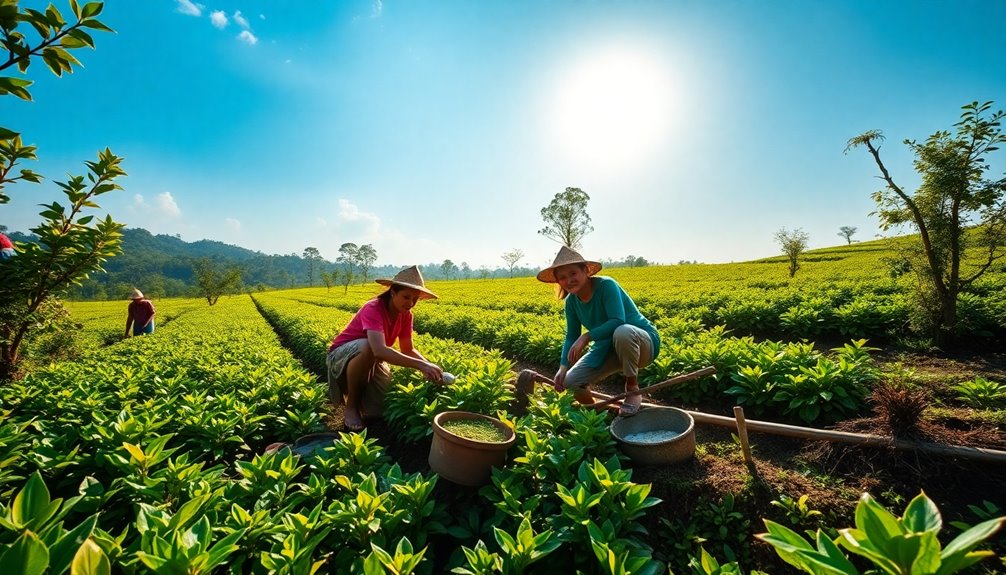
Addressing market access inequities opens up various practical applications that can empower small tea farmers. By supporting cooperative structures, you help small tea growers join forces. Groups like the Kenya Tea Development Agency show how teamwork can lead to better training, resources, and market access. This teamwork boosts profits and helps small-scale farmers thrive.
The demand for organic teas is growing, especially in Western markets. Small farmers can attract premium buyers by using artisanal methods. You can encourage these farmers to produce high-quality teas that stand out. Plus, fair trade practices can ensure they receive fair prices for their hard work.
Digitalization initiatives are also crucial. They can help smallholders improve their production quality and reach more customers. With access to technology, farmers can share their stories and products online, making it easier for you to find fantastic teas.
These practical applications are exciting! When you support small tea farmers, you're helping them create better lives while enjoying delicious teas. Let's cheer for small tea growers as they navigate the tea market, embrace organic options, and connect with consumers around the world!
Frequently Asked Questions
How Do Small Farmers Impact Global Tea Prices?
Small farmers significantly influence global tea prices by supplying unique flavors and organic options, catering to niche markets. Their production methods and sustainability practices can enhance demand, ultimately affecting pricing trends and market dynamics.
What Challenges Do Small Farmers Face in the Tea Industry?
Small farmers face numerous challenges in the tea industry, including limited access to resources, fluctuating market prices, and climate change impacts. These issues hinder your growth and ability to compete with larger producers effectively.
Are Small Farmers Involved in Tea Processing?
Yes, small farmers often participate in tea processing. They cultivate and harvest tea leaves, then engage in traditional methods to process them, which helps maintain the quality and unique flavors that consumers appreciate in specialty teas.
How Can Consumers Support Small Farmers in the Tea Market?
You can support small farmers by choosing fair-trade tea brands, visiting local markets, and promoting sustainable practices. Share their stories on social media, and encourage others to appreciate the hard work that goes into their tea.
What Are the Long-Term Trends for Small Farmers in Tea Production?
You'll notice long-term trends indicating increased demand for organic and sustainably sourced products. As consumers prioritize ethical sourcing, small farmers are likely to adapt, focusing on quality and unique offerings to stay competitive in the market.
Conclusion
In conclusion, small farmers play a huge role in the global tea market! They produce about 70% of the world's tea, using sustainable practices and smart pest management to grow their crops. However, they still face challenges in getting their tea to market. By supporting these hardworking farmers, we can help make the tea industry fairer and more vibrant. So, next time you enjoy a cup of tea, remember the small farmers who made it possible!

